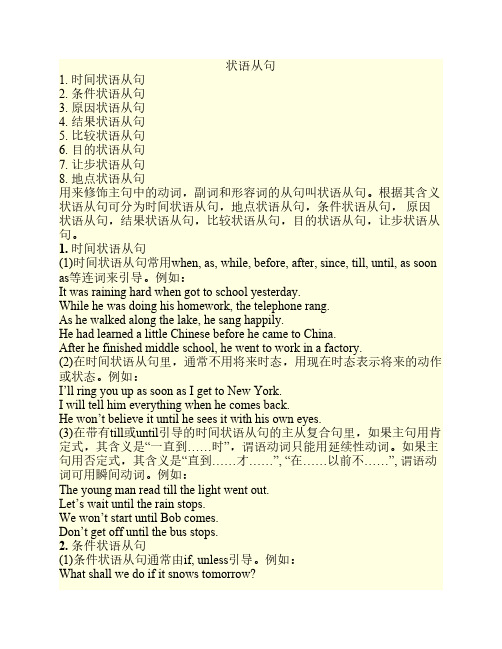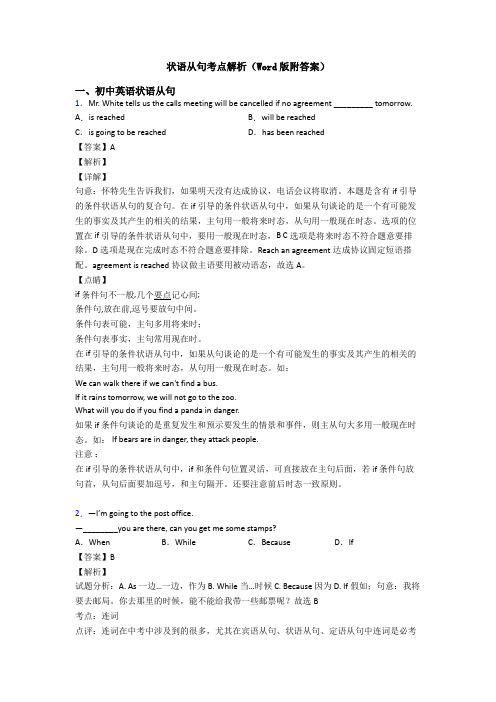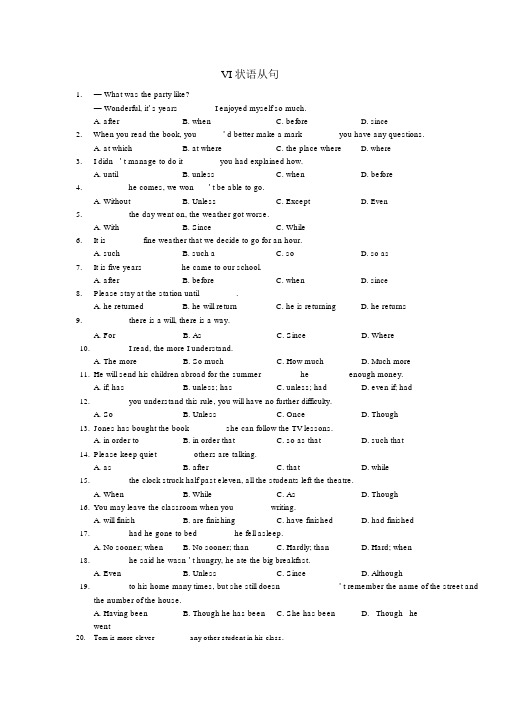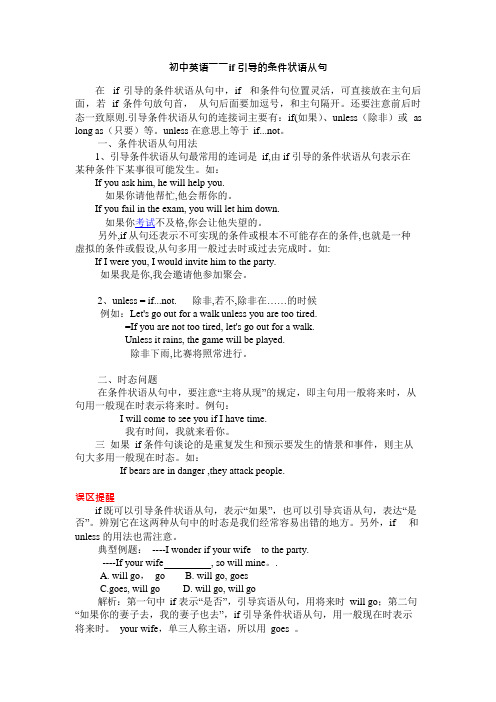(完整word版)初中条件状语从句(附答案)
最新状语从句中考经典题型带答案(word)

最新状语从句中考经典题型带答案(word)一、初中英语状语从句1.---Today, many people are in sub-health(亚健康), why?---Yes. They are so tired long time ________ they are busy with their work and exercise little every day.A.because B.until C.though D.or【答案】A【解析】【详解】句意:——今天,许多人处于亚健康状态,为什么?——是的。
他们长时间很累,因为他们忙于工作,每天很少锻炼。
考查连词辨析。
because因为,表原因;until直到,表时间;though尽管,表让步;or或者,表转折。
本句是原因状语从句,前果后因;根据句意结构和语境,可知选A。
2._______riding shared bikes is an easy way to travel, it also causes some problems. A.Although B.If C.Until【答案】A【解析】【详解】句意:虽然骑共享单车是一种简单的旅行方式,但也会引起一些问题。
A. Although尽管,虽然;B. If如果;C. Until直到。
根据下文it also causes some problems.可知上文是Although 引导的让步状语从句。
根据题意,故选A。
3.We don't know the love of our parents _______ we become parents ourselves one day. A.untilB.afterC.whenD.since【答案】A【解析】句意:直到有一天我们成为父母,才知道父母的爱。
本题考查连词。
A. until到…为止,在…以前; 直到…才;B. after在…以后;C. when当···时候;D. since自从; 从…以来;Not until 直到···才···;不到···不···,是固定搭配,故选A。
【英语】状语从句专题(含答案)(word)

【英语】状语从句专题(含答案)(word)一、初中英语状语从句1.I hate traveling by air______you usually have to wait for hours before the plane takes off. A.because B.though C.until D.so that【答案】A【解析】【详解】句意:我讨厌坐飞机旅行,因为通常要等上几个小时才能起飞。
A.因为,B.虽然,C.直到,D.为了,表目的。
根据前后句子之间关系可知,有因果关系,故选A。
【点睛】这四个选项都是连词,但是意思和用法各不相同。
because 因为,引导原因状语从句;though虽然,尽管,引导让步状语从句,类似的词还有although, even though, even if;until常和not连用,not …..until…意思是直到….才…..,引导时间状语从句; so that为了,表示目的,引导目的状语从句。
2.The Italian woman didn’t feel a culture shock____it was her first time to Shanghai. A.though B.since C.if D.when【答案】A【解析】句意:这个意大利妇女没有感到一种文化冲击,尽管她是第一次来上海。
A. though尽管;B. since自从;C. if 是否,如果;D. when当---时候;根据The Italian woman didn’t feel a culture shock这个意大利妇女没有感到一种文化冲击,和it was her first time to Shanghai.她是第一次来上海之间用though 引导让步关系状语从句;故选A3.______ Mike didn’t win the race , he was still wearing a smile on his face.A.If B.Since C.Although D.Because【答案】C【解析】【详解】句意:虽然迈克没有赢了比赛,但是他脸上仍然带着笑容。
初中状语从句总结及练习(附答案)

状语从句1. 时间状语从句2. 条件状语从句3. 原因状语从句4. 结果状语从句5. 比较状语从句6. 目的状语从句7. 让步状语从句8. 地点状语从句用来修饰主句中的动词,副词和形容词的从句叫状语从句。
根据其含义状语从句可分为时间状语从句,地点状语从句,条件状语从句,原因状语从句,结果状语从句,比较状语从句,目的状语从句,让步状语从句。
1. 时间状语从句(1)时间状语从句常用when, as, while, before, after, since, till, until, as soon as等连词来引导。
例如:It was raining hard when got to school yesterday.While he was doing his homework, the telephone rang.As he walked along the lake, he sang happily.He had learned a little Chinese before he came to China.After he finished middle school, he went to work in a factory.(2)在时间状语从句里,通常不用将来时态,用现在时态表示将来的动作或状态。
例如:I’ll ring you up as soon as I get to New York.I will tell him everything when he comes back.He won’t believe it until he sees it with his own eyes.(3)在带有till或until引导的时间状语从句的主从复合句里,如果主句用肯定式,其含义是“一直到……时”,谓语动词只能用延续性动词。
如果主句用否定式,其含义是“直到……才……”, “在……以前不……”, 谓语动词可用瞬间动词。
状语从句考点解析(Word版附答案)

在if引导的条件状语从句中,if和条件句位置灵活,可直接放在主句后面,若if条件句放句首,从句后面要加逗号,和主句隔开。还要注意前后时态一致原则。
2.—I’m going to the post office.
—________you are there, can you get me some stamps?
15.----Mike wants to know if ________ a picnic tomorrow.
---- Yes. But if it ________, we will visit the museum instead.
A.you have; will rainB.you will have; will rain
If it rains tomorrow, we will not go to the zoo.
What will you do if you find a panda in danger.
如果if条件句谈论的是重复发生和预示要发生的情景和事件,则主从句大多用一般现在时态。如:If bears are in danger, they attack people.
9.If the kids stay indoors all the time and get no exercise, they _________ weak.
A.becomeB.have becomeC.will becomeD.became
【答案】C
【解析】
【详解】
句意:如果孩子们一直呆在室内并且得不到锻炼,他们将变得很虚弱。If引导的条件状语从句主句用一般将来时,从句用一般现在时,结合语境故选C。
考点:考查连词。
(完整版)初中英语语法专练状语从句Word版含答案

VI 状语从句1.—What was the party like?—Wonderful, it’ s years ________I enjoyed myself so much.A. afterB. whenC. beforeD. since2. When you read the book, you’ d better make a mark ________you have any questions.A. at whichB. at whereC. the place whereD. where3.I didn ’ t manage to do it ________you had explained how.A. untilB. unlessC. whenD. before4. ________he comes, we won’ t be able to go.A. WithoutB. UnlessC. ExceptD. Even5.________the day went on, the weather got worse.A. WithB. SinceC. While6.It is ________fine weather that we decide to go for an hour.A. suchB. such aC. soD. so as7.It is five years ________ he came to our school.A. afterB. beforeC. whenD. since8.Please stay at the station until ________.A. he returnedB. he will returnC. he is returningD. he returns9.________there is a will, there is a way.A. ForB. AsC. SinceD. Where10. ________I read, the more I understand.A. The moreB. So muchC. How muchD. Much more11. He will send his children abroad for the summer ________ he ________ enough money.A. if; hasB. unless; hasC. unless; hadD. even if; had12. ________you understand this rule, you will have no further difficulty.A. SoB. UnlessC. OnceD. Though13. Jones has bought the book ________she can follow the TV lessons.A. in order toB. in order thatC. so as thatD. such that14. Please keep quiet ________others are talking.A. asB. afterC. thatD. while15. ________the clock struck half past eleven, all the students left the theatre.A. WhenB. WhileC. AsD. Though16. You may leave the classroom when you ________writing.A. will finishB. are finishingC. have finishedD. had finished17. ________had he gone to bed ________he fell asleep.A. No sooner; whenB. No sooner; thanC. Hardly; thanD. Hard; when18. ________he said he wasn ’ t hungry, he ate the big breakfast.A. EvenB. UnlessC. SinceD. Although19. ________to his home many times, but she still doesn ’ t remember the name of the street andthe number of the house.A. Having beenB. Though he has beenC. She has beenD. Though hewent20.Tom is more clever ________ any other student in his class.A. amongB. ofC. asD. than21.No matter how hard he worked, ________.A. he could not do any better C. so he could not do any betterB. and he could not do any better D. but he could not do any better22.The Italian boy was regarded as a hero ________he gave his life for his country.A. according toB. because ofC. on account ofD. because23.He was about to leave my house ________it began to rain.A. whileB. asC. whenD. since24.Ten minutes earlier, ________we could have caught the last train.A. orB. butC. andD. so25.________you do, try your best.A. WheneverB. WhereverC. WhateverD. However26.________, he has been dead for two months.A. Believe it or notB. If you believe it or notC. Whether believe or notD. You believe it or not27.________there were no buses, they had to walk to the cinema.A. WhileB. ForC. UnlessD. As28.________he is easy to get along with, I decide to share the room with him.A. Now thatB. Since thatC. Because ofD. For which29.China has a larger population ________.A. than that AmericaB. as AmericaC. than AmericaD. than that ofAmerica30.He succeeded in getting the gold medal ________.A. as expectingB. than expectedC. than expectingD. as expected31.He talks ________he knew everything in the world.A. becauseB. sinceC. as ifD. so that32.She no longer sang and danced ________she used to.A. likeB. asC. as thoughD. as if33.The park reaches________ the airport.A. so far asB. as far asC. so farther asD. as farther as34.________I know, the book is very useful to you.A. So far asB. So farC. So long asD. So as35.Stay ________you are and keep silent.A. in whichB. the placeC. at whichD. where36. Do you mind________?A. I sitting here for a whileB. if I shall sit here for a whileC. if my sitting here for a whileD. if I sit here for a while37.Although he is considered a great writer, ________.A. his works are not widely read C. so his works are not widely readB. but his works are not widely read D. still his works are not widely read38.________, a group of soldiers was advancing towards the position of the enemy.A. Because it was dangerousB. Unless it was dangerousC. If it was dangerousD. Dangerous as it was39.It wasn ’ t long ________he finished his speech.A. thatB. untilC. asD. before40.________you have passed the test, you have no reason to be proud of yourself.A. Even thoughB. As thoughC. Now thatD. No matter how41. Unless he ________the job on time next week, I can’ t tell him when he ________another job.A. finishes; is givenB. will finish; will be givenC. will finish; will giveD. finishes; will be given42.—Will you help your mother with the housework?—________.A. Only if I willB. Only that I mayC. Only when I wantD. Only if I may43.We sat in the front row ________we could see it better.A. forB. becauseC. so thatD. now that44.________, so the trip to the Middle East has to be called off.A. It has been raining for daysB. As the bad weatherC. Because of the bad weatherD. Because it has been raining for days45. It was evening, ________she couldn’ t feel her way home..A. forB. sinceC. whichD. while46.Our professor found his glasses ________he had left them.A. whereB. thatC. whichD. X47.Did the two girls look so much alike ________no one could tell them apart?A. butB. asC. so thatD. that48.No matter ________hard it may be, we must carry it out.A. whateverB. whatC. howD. X49.Soapy is not ________ as Susie.A. good as a studentB. as good studentC. as a good studentD. an as goodstudent50.The worker hung the portrait on the wall ________could be seen well.A. whereB. where itC. that itD. so that51.It is not so important what you say ________.A. but how do you say itB. as how you say itC. as how do you say itD. but how yousay it52.I usually watch television in the evening ________ I have to study for an examination.A. unlessB. ifC. whileD. when53.—Is Mr. White at home?—Of course, ________he has broken his leg, he must be in bed these days.A. whetherB. sinceC. ifD. so54.They are ________abroad as they were at home.A. almost as happyB. almost happy asC. as happy almostD.as almosthappy55.You can have your turn ________the barber finishes cutting my hair.A. the momentB. unlessC. becauseD. until56.However much ________, it will be worth it.A. does the house costB. costs the houseC. the house will costD. the house costs57. Go out tonight ________it’ s dark.A. whichB. whatC. whyD. while58.They won ’ t care ________they see it.A. what ifB. as ifC. even ifD. so that59.________these are people, they find ________there is waste.A. Where; thatB. When; thatC. What; XD. Whether; X60. ________you work, ________progress you’ ll make.A. The hard; the greaterB. Harder; greaterC. The harder; the greaterD. Harder; the greater1— 10. DDABD ADDDA11— 20. ACBDA CBDCD21— 30. ADCCC ADACD 31— 40. CBBAD DADDA41— 50. DDCAA ADCCB 51— 60. BABAA DDCACVII 名词从句1.I remember ________this used to be a quiet village.A. whenB. how c. where D. what2.________he said at the meeting astonished everybody present.A. WhatB. ThatC. The factD. The matter3.________leaves the room last ought to turn off the lights.A. AnyoneB. The personC. WhoeverD. Who4.The photographs will show you ________.A. what does our village look likeC. how does our village looks like5.Can you make sure________ the gold ring? B. what our village looks like D. how our village looks likeA. where Alice had putB. where had Alice putC. where Alice has putD. where has Alice put6.Please read ________you like.A. whateverB. no matter whatC. that allD. all what7.Ask her ________come with us.A. if she willB. if will sheC. whether sheD. whether willshe8.________we need money is quite clear.A. IfB. WhatC. ThatD. X9.________the car can be used has not been known yet.A. IfB. WhatC. ThatD. Whether10.________will take part in this English speech contest will be announced over the radio.A. WhoeverB. ThoseC. EveryoneD. Anyone11.________knows the secret will come here.A. WhoeverB. ThoseC. EveryoneD. Anyone12.________he will give us a lecture.A. We are told thatB. It is told thatC. We are told whichD. It is told13.________happened ________ he was unfit for the office.A. This; thatB. That; thatC. It; thatD. He; that14.________still needs to be discussed.A. How is the plan to be carried out C. Why is the plan carried outB. How the plan is to be carried out D. When is the plan carried out15. That ’ s ________the Party requires us to do.A. thatB. whyC. howD. what16.Energy is ________which makes things work.A. whatB. somethingC. anythingD. everything17. ________we can’ t understand is ________he didn’ t join us in our discussion.A. That; whyB. Which; howC. What; whatD. What; why18.The fact ________ he is a model teacher is well-known.A. whatB. whichC. whyD. that19.I have no idea ________.A. how fast does light travel C. that fast does light travelB. how fast light travels D. that fast light travels20.We were warned________ the experiment would be dangerous.A. ifB. whether D. that21.I wonder________ he made such a careless mistake.A. howB. thatC. whatD. why22.We all know ________he is getting along well with his studies.A. thatB. howC. whatD. which23.________do you think will join us in the work?A. WhomB. WhoC. ThatD. How24.I will give the book to________ wants to read it.A. whoeverB. whomeverC. whomD. that25.She often thinks of ________ she can do more for her motherland.A. whatB. how c. that D. which26.We took ________ for granted that they would accept our advice.A. thatB. thisC. itD. them27.He came back to the classroom to see ________he ________anything in it.A. that; had forgottenB. that; had leftC. if; had leftD.if;hadforgotten28.The teacher asked ________ his students.A. what the matter was withC. what was the matter with29.I don ’ t know________. B. which matter was with D. what was matter withA. who of them should we elect C. which of them I should electB. who of them we should elect D. which of them should I elect30.They expressed the hope ________they would come over to China again.A. whichB. whomC. whatD. that31.________that the scientist will give us a talk next month?A. Is trueB. Is it trueC. It’ s trueD. it’ s truly32.—________you did?—No, as a matter of fact I didn’ t need to.A. Is that whatB. Is what thatC. What is thatD. Is that which33.________ you don ’ t like him is none of my business.A. WhatB. WhoC. ThatD. Whether34.I know nothing about Jim________ he is an American.A. exceptB. besidesC. except forD. except that35.My idea is ________we should get more people to do the work.A. whatB. whichC. thatD. all36.It worried her a bit ________her hair was turning grey.A. whileB. that D. for37.It is clear ________the motion of a rocket depends not on air but on reaction.A. whenB. whetherC. ifD. that38.________doesn ’ t matter much ________dressouy are going to wear.A. This; thatB. That; whoC. It; whichD. It; who39.________we do must be in the interests of the people.A. ThingsB. ThatC. WhateverD. No matter what40.The reason ________we were late is ________we missed the train.A. why; becauseB. why; thatC. why; whyD. that; that41.________is unfit for the office.A. it seems to me that C. That seems heB. It seems to me that he D. That seems to him that42.It looks ________we shall have to do the work ourselves.A. thatB. likeC. seemingD. as though43.That he hasn ’ t come is ________he is busy writing the papers.A. thatB. whyC. becauseD. the reason44.The question is ________the book is worth reading.A. ifB. whetherC. howD. that45.________is not known yet.A. When she has goneB. Where she has goneC. How did she leaveD. Why did she go46.When and where we ________the meeting ________still a problem.A. have; areB. shall have; isC. had; isD. will have; are47.His suggestion ________to see the exhibition interested every one of us.A. that we goB. which we should goC. that we would goD.when weshould go48.Word came ________his poem won the first prize.A. thatB. whetherC. asD. because49.China isn ’ t ________she used to be.A. thatB. whichC. likeD. what50. I ’ ll tell him ________ with the coat.A. how pleased I amC. what I am pleased51.Have you any idea ________she did it? B. however I am pleased D. however pleased I amA. whatB. whyC. with whoD. about that52.Can you tell me ________ you go to the evening school per week?A. how soonB. how many timesC. how longD. how often53.________the man was a thief, the boy watched him closely.A. To think thatB. Thinking thatC. To think about thatD. thinking it that54. A TV reporter wanted to know ________people ________the film.A. how; thoughtB. what; thoughtC. how; likedD. what; liked55.________is going to America for further study.A. He is said thatB. People said that heC. It was said heD. It is said thathe56.I ’ ve got to make ________he told a lie.A. that clearB. it clear thatC. quite clearD. this clear that57.Could you tell me ________.A. what her name is b. what her name was C. What is her name D. what was hername58.That is ________paper came into use in china.A. howB. thatC. whatD. which59. It makes no difference________ we ’ ll share the office with.A. ifB. whetherC. whoD. that60.I don ’ t know ________they will do with this old machine.A. how1— 10. AACBC 31— 40. BACDCAACDABDCCBB. whatC. thatD. when11— 20. AACBD BDDBD21— 30. DABAB41—50. BDCBB BAADA51— 60. BBBCD BAACBCCCCD。
(完整word版)初中英语If引导条件状语从句

初中英―― if 引的条件状从句在 if 引的条件状从句中, if 和条件句地点灵巧,可直接放在主句后边,若 if 条件句放句首,从句后边要加逗号,和主句分开。
要注意前后一致原 .引条件状从句的接主要有: if( 假如)、unless(除非)或 as long as(只需)等。
unless在乎思上等于 if...not。
一、条件状从句用法1、引条件状从句最常用的是if, 由 if 引的条件状从句表示在某种条件下某事很可能生。
如:If you ask him, he will help you.假如你他帮忙 ,他会帮你的。
If you fail in the exam, you will let him down.假如你考不及格 ,你会他绝望的。
此外 ,if 从句表示不行的条件或根本不行能存在的条件 ,也就是一种虚的条件或假 ,从句多用一般去或去达成。
如 :If I were you, I would invite him to the party.假如我是你 ,我会邀他参加聚会。
2、 unless = if...not. 除非 ,若不 ,除非在⋯⋯的候比如:Let's go out for a walk unless you are too tired.=If you are not too tired, let's go out for a walk.Unless it rains, the game will be played.除非下雨 ,比将照旧行。
二、在条件状从句中,要注意“主将从”的定,即主句用一般未来,从句用一般在表示未来。
例句:I will come to see you if I have time.我有,我就来看你。
三假如 if 条件句的是重复生和示要生的情形和事件,主从句大多用一般在。
如:If bears are in danger ,they attack people.区提示if 既能够引条件状从句,表示“假如”,也能够引从句,表达“是否”。
初中英语If引导的条件状语从句(可编辑修改word版)

初中英语――if 引导的条件状语从句在if 引导的条件状语从句中,if 和条件句位置灵活,可直接放在主句后面,若if 条件句放句首,从句后面要加逗号,和主句隔开。
还要注意前后时态一致原则.引导条件状语从句的连接词主要有:if(如果)、unless(除非)或as long as(只要)等。
unless 在意思上等于if...not。
一、条件状语从句用法1、引导条件状语从句最常用的连词是if,由if 引导的条件状语从句表示在某种条件下某事很可能发生。
如:If you ask him, he will help you.如果你请他帮忙,他会帮你的。
If you fail in the exam, you will let him down.如果你考试不及格,你会让他失望的。
另外,if 从句还表示不可实现的条件或根本不可能存在的条件,也就是一种虚拟的条件或假设,从句多用一般过去时或过去完成时。
如:If I were you, I would invite him to the party.如果我是你,我会邀请他参加聚会。
2、unless = if...not. 除非,若不,除非在……的时候例如:Let's go out for a walk unless you are too tired.=If you are not too tired, let's go out for a walk.Unless it rains, the game will be played.除非下雨,比赛将照常进行。
二、时态问题在条件状语从句中,要注意“主将从现”的规定,即主句用一般将来时,从句用一般现在时表示将来时。
例句:I will come to see you if I have time.我有时间,我就来看你。
三如果if 条件句谈论的是重复发生和预示要发生的情景和事件,则主从句大多用一般现在时态。
【英语】状语从句知识点(大全)(word)

【英语】状语从句知识点(大全)(word)一、初中英语状语从句1.— What do you think of your junior middle school life?— I think it is colorful, I’m always busy.A.though B.while C.until D.because【答案】A【解析】【详解】本题考查:副词辨析。
选项分析:A. though虽然,尽管。
B. while虽然;然而。
C. until 在…以前;直到…时。
D. because因为。
综合分析前后句,可知此处填 though最合适,完整句意为:— What do you think of your junior middle school life?你觉得你的初中生活怎么样?—I think it is colorful, though I’m always busy.我认为它是丰富多彩的,虽然我总是很忙。
正确答案为:A2.The Italian woman didn’t feel a culture shock____it was her fi rst time to Shanghai. A.though B.since C.if D.when【答案】A【解析】句意:这个意大利妇女没有感到一种文化冲击,尽管她是第一次来上海。
A. though尽管;B. since自从;C. if 是否,如果;D. when当---时候;根据The Italian woman didn’t feel a culture shock这个意大利妇女没有感到一种文化冲击,和it was her first time to Shanghai.她是第一次来上海之间用though 引导让步关系状语从句;故选A3.You will lose the ability to pay attention, plan and stay active after one or two nights _____ you can sleep well.A.until B.when C.unless D.if【答案】C【解析】【详解】句意:除非你能睡好,否则一两个晚上之后你会失去关注、计划和保持活力的能力。
- 1、下载文档前请自行甄别文档内容的完整性,平台不提供额外的编辑、内容补充、找答案等附加服务。
- 2、"仅部分预览"的文档,不可在线预览部分如存在完整性等问题,可反馈申请退款(可完整预览的文档不适用该条件!)。
- 3、如文档侵犯您的权益,请联系客服反馈,我们会尽快为您处理(人工客服工作时间:9:00-18:30)。
条件状语从句讲解及练习一、考点归纳由连接词if或unless引导的状语从句叫做条件状语从句。
(注意:在含有条件状语从句的复合句中,如果主句是一般将来时态,从句要用一般现在是“主将从现原则”。
通常译作“假如,如果,除非”。
引导词:常用引导词: if , unless1.if 引导词用法学习" if " 引导的条件状语从句的用法,现在总结一下:if 条件句不一般, 几个要点记心间;条件句,放在前, 逗号要放句中间。
条件句表可能,主句多用将来时;条件句表事实,主句常用现在时。
if 引导的条件句有:真实条件句和非真实条件句两种:(1)真实条件句:表示在某种条件下某事很可能发生。
Eg:a)If you ask him, he will help you. 如果你请他帮忙,他会帮你的。
b)If you fail in the exam, you will let him down. 如果你考试不及格,你会让他失望的。
c)If it rains tomorrow, we won’t go on a picnic. 如果明天下雨,我们就不去野餐。
注意:切记紧跟着if的那句话是从句。
(2)非真实条件句是虚拟语气的一种,表示与事实相反,不可实现的条件或根本不可能存在的条件,也就是一种虚拟的条件或假设,从句多用一般过去时或过去完成时。
Eg:a)If I were you, I would invite him to the party. 如果我是你,我会邀请他参加聚会。
b)I would have arrived much earlier if I had not been caught in the traffic. 如果没有堵车,我会到的早一点儿。
c)If I were you, I would go with him. 如果我是你,我会和他一起去的。
2. unless引导词用法(1)固定搭配: unless = if...not 除非,若不,除非在……的时候。
Eg:a)You will fail to arrive there in time unless you start earlier.=If you don’t start earlier, you will fail to arrive there in time. 如果你不早点动身,你就不能及时赶到那儿。
b)Unless it rains, the game will be played.=If it dosen't rain,the game will be played. 除非下雨,比赛将照常进行。
c)Let's go out for a walk unless you are too tired.d)= If you are not too tired, let's go out for a walk经典语句:If it dosen't rain tomorrow,we will go to the zoo. 条件状语从句就是用以表示“在某种条件下,会…”二、课堂练习I 用所给词的适当形式填空1.If you ________(feel) tired, you _______________ (have) to have a rest.2. Where _______ he _________(see) the film if he ________________(have) time?3. If there __________(be) fewer trees, there _______________( be) more pollution.4. He _____________(dress) more casually if he ________________( not work) on weekends.5. If Marcia _____________(live) alone, she ___________________( keep) a pet parrot.6. Lana ________________( buy) a new dress if the old one ____________(be) out of style.7.The twins ______________(fight) if they_______________(argue).8. I ____________(have) a bake sale if I _____________(need) money for education.9. Peter _____________( send) me a beautiful souvenir if he ________________(tour) Spain.10. If Mr Green ___________(say) I am hard- working, my parents _________( feel) glad.11.I ____________(go) to the beach if it________________ ( not rain) this week.12. __________they __________( have) a match if the P.E. teacher _____________(be) busy?13.He ____(write) a letter to his grandparents if he ____(get) his report card this week.14. If she ____________(get) up late, she _____________ ( not catch) the early bus.15. Peter ________(major) in English if he ____(pass) the exams in Peking University.15.如果他到的晚了会发生什么事情?What _______________ if he _____________ late?16. 如果努力学习,你就会取得好成绩。
If you__________ _________, you ___________ good _____________.17. 他如果看电视太久了,他的父母会不高兴。
If he _________ TV too much, his parents __________ __________ unhappy.18. 如果我们为他组织生日聚会,大家都会来的。
Everyone ________________ if we _____________ a birthday party __________ him.19. 如果明天不下雨,我会和你一起去公园的。
If it __________ __________ tomorrow, I ______________ go to the park _________ you.20. 如果她睡过头了,就会旅游迟到的。
She;__________________________ the trip if she ___________________.21. 如果他有空,他会帮助你的。
If he _________________, he _________________ you.22. 如果Tom考试不及格,他就没有机会上高中了。
Tom _________have the ________to go to the ________high school if he ________ the exams.23. 你如果抄同学的作业就不能学好各门功课。
You _______ _____ good at all the subjects if you ______ the other students’ homework.II.单项选择1.If you _____ to the party, you’ll have a great time.A. will goB. wentC. goD. going2. It will be a long time ____ Peter _____ his work.A. since, has finishedB. after, finishesC. when, will finishD. before, finishes.3. What will father _____ us from Japan?A. takeB. bringC. carryD. make4. Weifang is famous ______ kites.A. forB. toC. onD. with5.I ____ her the answer if she ____me.A. can tell, will askB. will tell, will askC. would tell, askD. will tell, asks6. – What are you going to do tomorrow?--We’ll go to the library tomorrow if it ___.A. isn’t rainB. rainC. won’t rainD. doesn’t rain7.—Do you know when he will come back tomorrow?--Sorry, I don’t know. When he ____ back, I’ll tell you.A. comesB. will comeC. comeD. may come8. What will you do if you _____ to the old folk’s home visit?A. goB. wentC.goingD. will go9. If I eat ____ food, I’ll be very fat.A. too manyB. many tooC. too muchD. much too10. I’ll give the book to him if he ___ here next Sunday.A. will comeB. comesC. is comingD. came11. There ____an English film in our school tomorrow.A. is going to haveB. will haveC. is going to beD. has12. Could you tell us where ____?A. will the next Olympic Games heldB. the next Olympic Games will be heldC. would the next Olympic Games be heldD. the next Olympic Games would be held13. When my mother returned last night, I ____ a book.A. readB. am readingC. was readingD. am going to read14.What ____ you ____ when it began to rain?A. do, doB. were, doingC. are, doingD. did, do15. I’ll w ake you up when he ____back.A. willB. is going to comeC. comesD. come1---5 CDBAD 6---10 DAACB 11---15 CBCBC。
